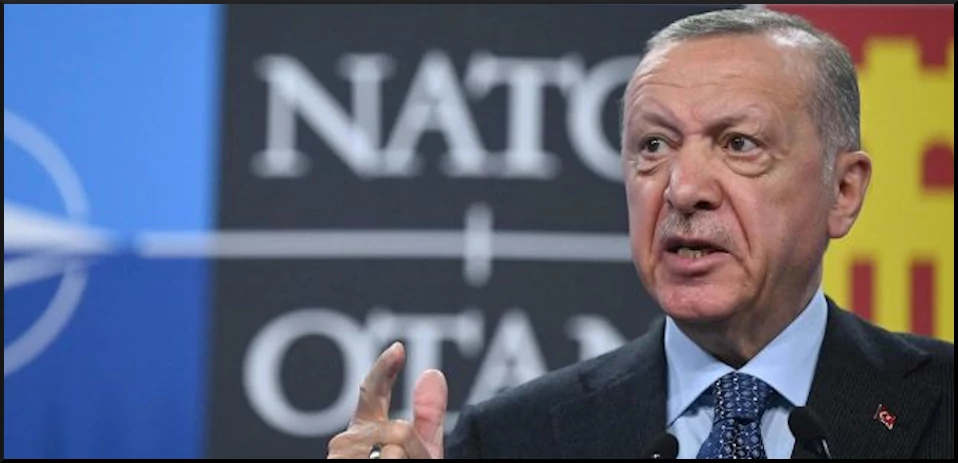by Uriel Araujo, published on InfoBRICS, February 10, 2023
The Turkish authorities in Ankara have been blocking Stockholm’s bid to join NATO allegedly over the Nordic country’s policies regarding Kurdish exile groups. On January 23, Turkish President Recep Tayyip Erdogan himself said Sweden should not expect any “goodwill” from his country because Stockholm, according to him, lets “terrorist organizations run amok.” It is a well known fact that many Swedish politicians have taken part in events organized by Kurdistan Workers’ Party (PKK) sympathizers, Sweden being home to a relatively large Kurdish diaspora. Turkey has certainly displayed a lack of “good will” towards Swedish adhesion to NATO, and, while, the reasons for that so far stated by Erdogan are certainly issues that do concern Ankara, in the complex realm of international relations, there often lie deeper reasons underneath official statements.
Today, political decisions regarding foreign policy can often be part of a kind of “quid pro quo”. Such was the case with Washington’s recognition of Morocco’s claims over Western Sahara, for instance: it took place only after Morocco normalized its relations with the US main ally in the Middle East, namely Israel.
Ankara has been playing an ambiguous role within the NATO structure. It clearly makes good use of its veto power to obtain leverage. What could then be its most pressing goals about the Sweden issue? The issue is not merely about Ankara and Stockholm: Washington has been pushing Sweden and Finnish accession to the Atlantic alliance from day one.
The issue must be understood as part of the new blueprint for the US-dominated Atlantic organization, as it has become clear during the NATO Summit in Madrid. After this Summit, in June 2022, Biden claimed that Russian President Vladimir Putin was looking for the “Finlandization of Europe”, but would get instead the “NATOization” of the continent. Therefore, the Sweden-Finland issue is part of the militarization of the continent, as pursued by Washington, which also desires to make it increasingly nuclearized. As a matter of fact, the two countries’ membership will extend the Atlantic Alliance’s territorial reach as far out as the Russian eastward Arctic flank, thus making Russia the only non-NATO country in the Arctic. This is part of the overall aggressive Western strategy of “encircling” Russia.
Keeping in mind NATO’s notorious will to expand, since at least 1999, which, by the way, was a breach of the 1990 promise, one could arguably reason that Moscow’s main goals thus far have been defensive and a response to that, and that NATO’s expansion was and is one of the main causes of today’s conflict in Ukraine.
That being said, Ankara, however, has its own geopolitical goals for Western and Central Asia and beyond. They are focused on the ideas of Turanism and Pan-Turkism, about which I wrote a number of times. The Turkish aggressive agenda in fact could further complicate its already complex relationship with Russia.
In November 2022, Turkey was preparing military operations against Kurds in northern Syria. But in July 2022 it already became clear that the issue of Swedish NATO membership could open the way for further Turkish demands concerning Kurdish groups in Syria that rebel against the Turkish occupation of that region. One could say Ankara has been at an undeclared war with its Syrian neighbor for a while. Turkish forces and their proxies have controlled the northern Syrian city of Afrin since 2018, for instance, and it seems Ankara seeks to further annex and to “turkify” an even larger chunk of the rebel areas there: it has backed Turkic militants in the Syrian-Turkish border and has imposed a Turkified school curriculum in some areas.
Halil Karaveli, a senior fellow with the Central Asia-Caucasus Institute & Silk Road Studies Program Joint Center, argues that what Ankara really wants is not just that Sweden take some measures but rather the end of American support for Kurdish groups in Syria.
The US continues to support rebel Kurdish groups in Syria, such as the Democratic Union Party (PYD) and the People’s Defense Units (YPG). Washington has been also arming and funding PKK-connected rebels in Syria, who fought against the Daesh. From Ankara’s perspective, a Kurdish “statelet” adjacent to the Turkish border with Syria would be an existential threat, according to Karaveli. For the US, however, those are key allies in its proxy war with Iran, another key player in the region. For Turkey, those are state’s enemies and, in all likelihood, it will never allow Sweden to join NATO unless the US changes its Kurdish policy. In other words, American goals and interests in Europe and in the Middle East simply cannot be reconciled.
Whether Washington is ready or not to “sacrifice” its proxy efforts in Syria in exchange for having Sweden into NATO still remains to be seen.
This complex situation also places Moscow in a very intricate position, as it diplomatically manages to “balance” and to engage with its partners like Turkey, Syria, and Israel. While involved in a major conflict now, the Russian Federation still has the soft power and the resources to mediate between these different Western Asian states, as it seems to be doing now.
Uriel Arajau is a researcher with a focus on ethnic and international conflict.
 Syria Support Movement solidarity with the Syrian people
Syria Support Movement solidarity with the Syrian people





